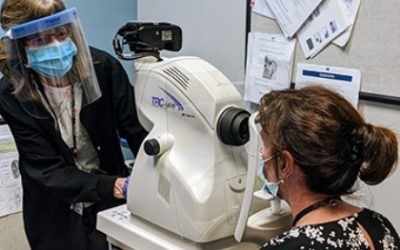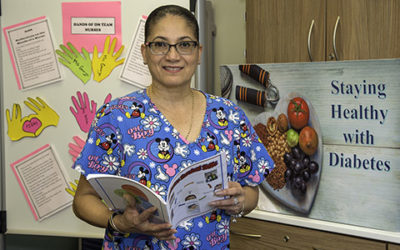Individualizing hemoglobin A1c treatment goals in older adults is important to balance risks in benefits, according to a new study.
Elevated Preoperative Glucose Level Linked to Adverse Effects in Hernia Repair
An estimated 1 in 10 Americans and 1 in 4 veterans has diabetes, not only putting them at increased risk for problems such as heart and kidney disease, but also making them more prone to complications such as infection and bleeding following surgery.
Diabetes Drug Metformin Shows Promise for Reducing Incident Osteoarthritis
Metformin is recommended as first-line therapy for Type 2 diabetes at the VA and elsewhere. Among the benefits, according to the VA PBM, is that the drug, which has been in use for decades, is low-cost and safe to initiate in most patients, even those with moderate renal dysfunction.
Dietician Mary Julius Champions VA’s Virtual Diabetes Education Program
When Mary Julius was diagnosed with Type 1 diabetes in 1974, the world was a very different place. There were only approximately 4.5 million Americans who had been diagnosed with diabetes.
Overall Prescriptions Are Low at VHA for CVD, CKD Protective Diabetes Drugs
Even though novel therapies for type 2 diabetes have been proven to reduce the risk of cardiovascular disease and chronic kidney disease progression, VHA prescription rates remain low.
Glargine, Liraglutide More Effective for Reaching, Maintaining T2D Targets
Clinicians treating Type 2 diabetes have an arsenal of medications to help lower glucose levels in patients with uncontrolled blood sugar. The key question regards which work best to lower glucose levels and keep them low.
Diabetes Genetic Risk Score Linked to Dementia in Some Veterans
Using the VA’s Million Veteran Program data, a new study has determined that a diabetes genetic risk score is associated with all-cause dementia and clinically diagnosed vascular dementia in veterans.
Rural T2D Patients Improved With Remote VA Care
How did a novel approach to provide diabetes specialty team care to rural veterans with Type 2 diabetes (T2DM) affect clinical outcomes and processes of care?
T2D Drugs Didn’t Differ in Preventing CV Complications
Not many studies have looked at the comparative effectiveness of commonly used glucose-lowering medications, when added to metformin, on preventing microvascular and cardiovascular disease outcomes in Type 2 diabetes.
VA Researchers Identify Key Factor in ACCORD’s Increased Mortality
Optimal diabetes management requires striking a careful balance. Over time, high blood glucose levels impair cardiovascular function, leading to delayed wound healing, heart disease and elevated risk of stroke.
Drilling Down in Past Studies Can Help Individualize Type 2 Diabetes Treatment
One size doesn’t fit all, even when it comes to deciding which Type 2 diabetes patients would derive cardiovascular benefit from intensive glycemic control.
Recovered COVID-19 Patients Have Much Greater Risk of Incident Diabetes
While it has been obvious for some time that the COVID-19 pandemic would create longer-term health effects, it is only now becoming clearer what some of those might be.
Why Does Sex Make a Difference in Statin Use Among Older Veterans?
Cardiovascular disease is the No. 1 cause of death for women in the United States, and female veterans are at particular risk.
Clinical Pharmacy Specialists Help Veterans Keep Diabetes Under Control
Diabetes affects one in four veterans—a rate more than double that of the general population. In an effort to improve glycemic control among veterans with diabetes the VA involves clinical pharmacy specialists (CPSs) in medication management, a strategy that has proven beneficial in a studies at a number of centers.
Ketogenic Diet With Coaching Appears Beneficial for Veterans With Diabetes
Diabetes affects more than 34 million—or nearly 10% of—Americans and is the seventh-leading cause of death in the U.S. The prevalence is even higher among U.S. veterans; approximately 25% of individuals who’ve served in the military have diabetes.
Recent VA Review Calls for More Research on Ketogenic Diet Benefits
A recent review noted that ketogenic diets, which generally are very low in carbohydrate and very high in fat, have traditionally been employed to treat epileptic disorders, although they have been touted as a therapy for Type 2 diabetes and a range of other health conditions—neurodegenerative diseases, cancer, obesity, heart failure and nonalcoholic fatty liver disease (NAFLD).
SGLT2 Inhibitors Found to Be Superior to Sulfonyureas in Veterans’ T2D
Sodium-glucose cotransporter 2 (SGLT2) inhibitors, a relatively new class of antihyperglycemics, have become an important tool in the treatment of Type 2 diabetes—a disease that affects an estimated 25% of VA patients.
Intensive Glycemic Control Not Eye-Protective in Advanced Diabetes
Intensive glycemic control (INT) does not appear to have a protective effect when it comes to required eye procedures in patients with advanced diabetes.
Dulaglutide Might Reduce Erectile Dysfunction in T2D Patients
Even though diabetes is a major risk factor for erectile dysfunction, the effect of GLP-1 receptor agonists on erectile dysfunction remains unclear.
Antimuscarinic Agents Up Diabetes Risk in Female MHS Patients
Are drugs used to treat overactive bladders a risk factor for development of Type 2 diabetes mellitus (T2DM)?
SGLT2 Inhibitor Use Lower Among Women, Minorities
Sodium-glucose cotransporter 2 (SGLT2) inhibitors significantly reduce deaths from cardiovascular conditions, hospitalizations for heart failure and progression of kidney disease among patients with Type 2 diabetes
Sleep Disorders More Prevalent in Army Vs. Other Services
While sleep problems are widespread in active-duty U.S. military servicemembers, Army personnel appear to have the most problems.
Rising T2D Rates Increase VA’s Lower Extremity Amputations
Incidence rates of lower extremity amputation increased at the VA between 2008 and 2018, and burgeoning rates of diabetes played a role in the trend.
Uncontrolled Diabetes Limits Bariatric Surgery Benefits
About a third, 34%, of veterans 28% of military healthcare beneficiaries are considered obese.
Metformin Appears Underused for T2D in Veterans
About 80 million prescriptions are written in the United States each year for metformin.
Apps, Wearable Devices Increasingly Help Veterans Improve Diabetes Management
Like Americans everywhere, veterans have integrated smartphones and wearable devices into many aspects of their lives.
Pandemic Highlights Benefits of Continuous Glucose Monitors
For veterans with diabetes, managing their numbers has never been more important. While diabetes does not increase the risk of contracting COVID-19,
Technology Helps Veterans Better Manage Diabetes During Pandemic Restrictions
Across the country, diabetes patients have faced extraordinary challenges throughout the pandemic.
More Benefits for Metformin Are Emerging Beyond Blood Glucose Control
Metformin is like a fine red wine: Its appeal continues to grow over time. More than 70 years after its first clinical use in diabetes, the staple of blood glucose control continues to surprise researchers with unexpected benefits in treating COVID-19, cancer and dementia.
VA Expands Tools to Help Veterans and Clinicians Manage Hypoglycemia Risk
For years, diabetes management was primarily concerned with keeping blood sugar from going too high. Now, and especially at the VA, keeping blood glucose from going too low is just as important.





